#collective bargaining
Text
SOLIDARITY ALERT:
Sesame Workshop writers

Writers at Sesame Workshop are on the verge of a strike.
These writers are fighting for a contract with industry-standard annual raises, improvements to residuals and coverage of all writing work performed for Sesame Workshop—including animation and social media segments.
Their current contract expires this Friday, April 19.
GO HERE TO SUBMIT A (pre-drafted, editable) LETTER OF SUPPORT 👇👇👇👇👇
If the company continues to refuse to engage on core issues and a deal can’t be reached by that deadline, Writers Guild of America East (WGAE) and Writers Guild of America West (WGAW) members at Sesame Workshop have unanimously voted to authorize a strike.
Your support will ensure that the negotiating committee has the leverage they need to make the strongest possible deal before their contract expires on Friday—or to have the WGAE Council and WGAW Board call for a strike if the company is still unwilling to meet its workers' reasonable demands.
source: AFL-CIO email newsletter
#strike#writers guild of america#labor#labor rights#aflcio#unions#unionize#workers rights#union#collective bargaining#sesame street#public broadcasting#creators on strike#oscar the grouch#big bird#bert#ernie#elmo
50 notes
·
View notes
Text
I love you writer’s strike, I love you pending UPS strike, I love you worker solidarity, I love you collective bargaining, I love you fair compensation, I love you disruption of capitalistic ideal, I love you labor laws, I love you fights for higher minimum wage, I love you unionization, I love you the growing awareness of class solidarity, I love you lower profit margins for better pay
2K notes
·
View notes
Note
Since SAG AFTRA has also gone on strike, does that mean the negotiations between the WGA and executives went poorly?
This is a great question, because it allows me to do some educating about labor law!
Today's topic: "bad faith" bargaining.

While often honored more in the breach than the observance, U.S labor law requires employers to engage in collective bargaining with unions, once those unions have been recognized as the "exclusive representative" of the workers via card check or union election.
Because Leon Keyserling and Senator Robert Wagner were not idiots and could see it coming that employers would drag out negotiations in order to try to destroy the union through attrition, the Wagner Act of 1935 required employers to not just negotiate with unions, but to negotiate "in good faith" and made it a violation of the law to negotiate in bad faith.
Two major forms of negotiating in bad faith are "dilatory tactics" (deliberately using the procedures of collective bargaining and labor law more generally to delay the process) and "surface bargaining" (where the employer goes through the motions of meeting with the union, but refuses to engage in substantive discussions). This can include stuff like sending representatives who don't have authority to negotiate, refusing to schedule sessions or trying to unilaterally control the timeline, not asking questions or engaging in back-and-forth discussion, refusing to discuss topics that are germane to conditions of employment, and so forth.
These kinds of actions are considered Unfair Labor Practice violations and the NLRB can issue "cease and desist" orders and "affirmative bargaining" orders, as well as some rather creative "special remedies" that get around the Wagner Act's lack of monetary penalties. As that suggests, however, part of the problem is that because the Wagner Act doesn't have significant monetary penalties, a lot of companies will just budget a line item for breaking the law and treat that as the cost of doing business, while using the same dilatory tactics to appeal NLRB decisions through the courts in the hope that they can outlast the union. (This is why one of the most effective labor law reforms that could be passed in a Democratic Congress would be adding compounding daily monetary penalties and streamlining the ULP process in both the NLRB and the courts.)
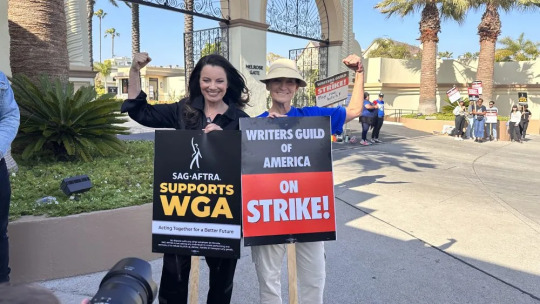
From what I've read of the negotiations, I think there's a pretty clear cut case that AMPTP engaged in surface bargaining and used dilatory tactics, with the intent to run out the clock and thus provoke a strike in which they believed economic pressure would force the union into surrender, essentially a lock-out without declaring a lock-out.
I think it's backfired on them. A big part of AMPTP's strategy for winning that strike was to divide-and-rule - hence why they came to an agreement with the Director's Guild - by getting through the lean months by filming and releasing shows and movies with already-completed scripts. Now that SAG-AFTRA is on strike, that lifeline of content is immediately cut - which means AMPTP is going to run out of revenue in the near future, which as WGA leaders have pointed out means bad quarterly earnings reports, which means stock prices tank, which means investors and boards of directors get angry and executives become the ones facing the prospect of losing their jobs at the same time that all the compensation they've structured as stock options to avoid taxes loses value.
476 notes
·
View notes
Text
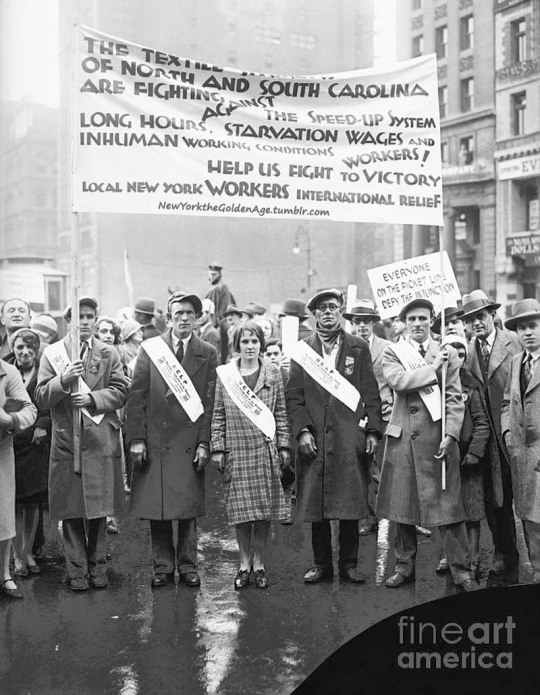
For years, May 1 was celebrated as International Workers' Day, also known as Labor Day in some countries, and often referred to as May Day. Here, in 1929, these five South Carolinan textile strike leaders marched in the Communist May Day Parade at Union Square. They carried signs, some of which pleaded for help, and others read, "Everyone on the picket line! Defy the Injunction!" May Day in New York passed quietly.
Photo: Bettmann Archive/Getty Images/Fine Art America
#vintage New York#old NY#1920s#1 May#May 1#May Day#workers#labor#unions#strikes#collective bargaining#parade#Communism#Union Square
438 notes
·
View notes
Text
🗣️ Please pay attention
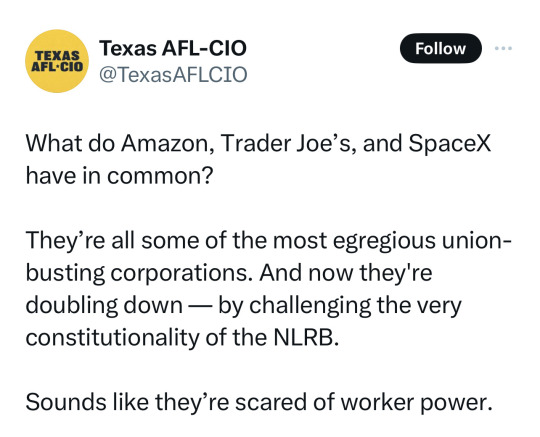

Amazon argues that national labor board is unconstitutional, joining SpaceX and Trader Joe’s
Amazon is arguing in a legal filing that the 88-year-old National Labor Relations Board is unconstitutional, echoing similar arguments made this year by Elon Musk’s SpaceX and the grocery store chain Trader Joe’s in disputes about workers’ rights and organizing.
The Amazon filing, made Thursday, came in response to a case before an administrative law judge overseeing a complaint from agency prosecutors who allege the company unlawfully retaliated against workers at a New York City warehouse who voted to unionize nearly two years ago.
In its filing, Amazon denies many of the charges and asks for the complaint to be dismissed. The company’s attorneys then go further, arguing that the structure of the agency — particularly limits on the removal of administrative law judges and five board members appointed by the president — violates the separation of powers and infringes on executive powers stipulated in the Constitution.
The attorneys also argue that NLRB proceedings deny the company a trial by a jury and violate its due-process rights under the Fifth Amendment. (source)
ICYMI, this is a case of corporations going, “7th Amendment Protections for me, but not for thee.”
It is strongly worth noting that in 2018 the John Roberts Court ruled 5-4 that companies can use forced arbitration clauses to stop people from joining together to fight workplace abuses - in effect denying individuals their 7th Amendment protections.
Subsequently, binding arbitration clauses used by corporations has proliferated; sneaking into all manner of common legal documents: personal banking applications, ordinary car loan applications, furniture purchases, and more. This is, unsurprisingly, a direct violation of the 7th Amendment that guarantees HUMAN BEINGS AND PEOPLE the right to a jury trial in certain civil cases and inhibits courts from overturning a jury's findings of fact. Republicans and SCOTUS are perfectly okay with corporations having more rights than workers and using forced arbitration to block people from having access to jury trials—but God forbid if corporations don’t have their right to a jury trial.
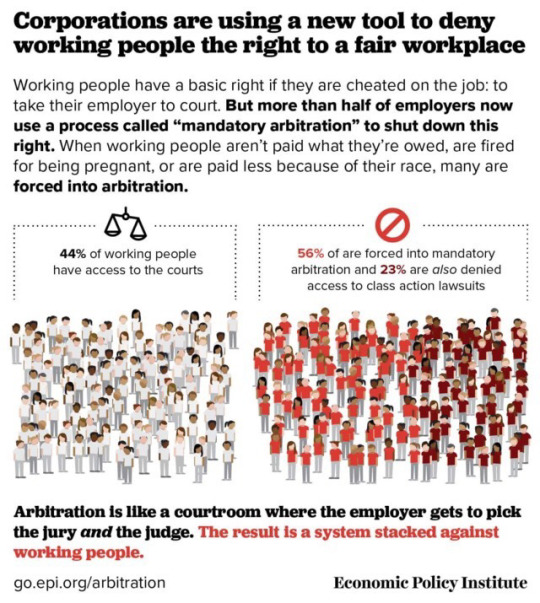
This legislative push to bestow corporations with more rights than people, while simultaneously taking away rights from human beings, has been nothing if not thoroughly and methodically done. At this rate, no corporation will ever need to fear a class action lawsuit again.
Amazon, SpaceX and Trader Joe’s are union busting.
But this latest case against the NLRB isn’t just an attack on labor and worker’s rights, it’s a fascistic attack on the very heart of fairness and democracy itself.
#politics#amazon#7th amendment#forced arbitration#spacex#trader joes#nlrb#workers rights#class action lawsuits#labor unions#union busting#collective bargaining#labor law#labor rights#scotus#john roberts court#john roberts#republicans are evil
100 notes
·
View notes
Text
"How much safer has construction really gotten? Let’s take a look.
Construction used to be incredibly dangerous
By the end of the 19th century, what’s sometimes called the second industrial revolution had made US industry incredibly productive. But it had also made working conditions more dangerous...
One source estimates 25,000 total US workplace fatalities in 1908 (Aldrich 1997). Another 1913 estimate gave 23,000 deaths against 38 million workers. Per capita, this is about 61 deaths per 100,000 workers, roughly 17 times the rate of workplace fatalities we have today...
In a world of dangerous work, construction was one of the most dangerous industries of all. By the 1930s and early 1940s the occupational death rate for all US workers had fallen to around 36-37 per 100,000 workers. At the same time [in the 1930s and early 1940s], the death rate in construction was around 150-200 deaths per 100,000 workers, roughly five times as high... By comparison, the death rate of US troops in Afghanistan in 2010 was about 500 per 100,000 troops. By the mid-20th century, the only industry sector more dangerous than construction was mining, which had a death rate roughly 50% higher than construction.
We see something similar if we look at injuries. In 1958 the rate of disabling injuries in construction was 3 times as high as the manufacturing rate, and almost 5 times as high as the overall worker rate.
Increasing safety
Over the course of the 20th century, construction steadily got safer.

Between 1940 and 2023, the occupational death rate in construction declined from 150-200 per 100,000 workers to 13-15 per 100,000 workers, or more than 90%. Source: US Statistical Abstract, FRED
For ironworkers, the death rate went from around 250-300 per 100,000 workers in the late 1940s to 27 per 100,000 today.
Tracking trends in construction injuries is harder, due to data consistency issues. A death is a death, but what sort of injury counts as “severe,” or “disabling,” or is even worth reporting is likely to change over time. [3] But we seem to see a similar trend there. Looking at BLS Occupational Injuries and Illnesses data, between the 1970s and 2020s the injury rate per 100 workers declined from 15 to 2.5.
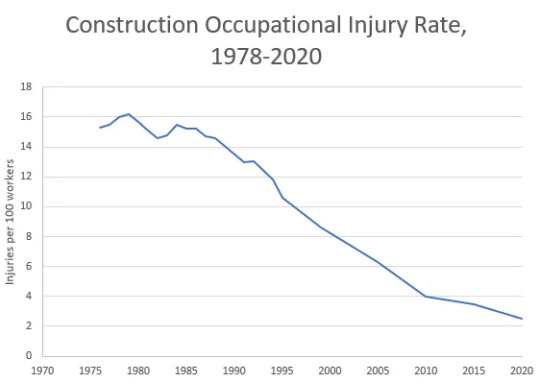
Source of safety improvements
Improvements in US construction safety were due to a multitude of factors, and part of a much broader trend of improving workplace safety that took place over the 20th century.
The most significant early step was the passage of workers compensation laws, which compensated workers in the event of an injury, increasing the costs to employers if workers were injured (Aldrich 1997). Prior to workers comp laws, a worker or his family would have to sue his employer for damages and prove negligence in the event of an injury or death. Wisconsin passed the first state workers comp law in 1911, and by 1921 most states had workers compensation programs.
The subsequent rising costs of worker injuries and deaths caused employers to focus more on workplace safety. According to Mark Aldrich, historian and former OSHA economist, “Companies began to guard machines and power sources while machinery makers developed safer designs. Managers began to look for hidden dangers at work, and to require that workers wear hard hats and safety glasses.” Associations and trade journals for safety engineering, such as the American Society of Safety Professionals, began to appear...
In 1934, the Department of Labor established a Division of Labor Standards, which would later become the Occupational Safety and Health Administration (OSHA), to “promote worker safety and health.” The 1935 National Labor Relations Act (NLRA), which legalized collective bargaining, allowed trade unions to advocate for worker safety.
Following WWII, the scale of government intervention in addressing social problems, including worker safety, dramatically increased.
In addition to OSHA and environmental protection laws, this era also saw the creation of the Consumer Product Safety Commission (CPSC), the National Highway Traffic Safety Administration (NHTSA), and the National Institute for Occupational Safety and Health (NIOSH).
OSHA in particular dramatically changed the landscape of workplace safety, and is sometimes viewed as “the culmination of 60 or more years of effort towards a safe and hazard-free workplace.”"
-via Construction Physics (Substack newsletter by Brian Potter), 3/9/23
#construction#osha#workplace#workplace safety#workers rights#labor rights#occupational health#nlra#collective bargaining#united states#us history#labor unions#industrial revolution#this is why unions and regulations are so fucking important by the way#if you have not studied late 1800s and early 1900s labor history in the US#you really can't grasp how incredibly dangerous things used to be#and how much proof we have that corporations suck#government regulations
88 notes
·
View notes
Text
Ford govt to ignore workers right to collective bargaining and impose a contract and will likely end up in court over it. Liberal govt has done this in the past and lost in court too. Ten years after the fact the union was awarded millions in compensation
183 notes
·
View notes
Text
SAG-AFTRA & Studios Could Meet Within Days
Deadline Sept 26, 2023
EXCLUSIVE: (Updated with SAG-AFTRA statement) As the WGA leadership and members move forward on the scribes’ tentative agreement with the studios and streamers, the 160,000-strong actors union could be sitting down with the AMPTP within days.
Riding the momentum that has hit Hollywood since the WGA and the Alliance of Motion Picture and Television Producers struck a deal on September 24, SAG-AFTRA leaders have penciled in meetings with the Carol Lombardini-led group by the end of next week, we hear.
As always in labor relations, the situation is fluid, and no negotiation has truly started until all participants are seated at the bargaining table. “We have no confirmed dates scheduled and there will not be meetings with the AMPTP this week,” a SAG-AFTRA spokesperson said Tuesday. “When we do have dates confirmed, we will inform our members. No one should rely on speculation.”
The AMPTP did not respond to Deadline’s requests for comment on the potential meetings.
The actors union has been on strike since July 14, when its members joined the WGA on the picket lines, creating Hollywood’s first joint strike since the Kennedy administration. The writers have suspended picketing and are awaiting details about their deal, which could come today or tomorrow.
WGA leaders on both coasts are scheduled to vote today on whether to send the tentative agreement to the general membership for ratification. If that occurs as expected, a vote by the nearly 12,000 members of the guild could come within several days, and a “yes” from them would end the WGA strike.
But the actors remain on the picket lines for now as both unions have pledged and shown solidarity with each other throughout the current labor strife.
While the WGA and SAG-AFTRA share similar concerns about AI, residuals and data transparency, to name a few, the actors union has some individual concerns that need to be addressed in its contract talks.
SAG-AFTRA President Fran Drescher has been vocal and passionate in her rhetoric, saying, among other things, that “the AMPTP’s maniacal corporate culture for greed must stop.”Meanwhile, the union’s National Executive Director Duncan Crabtree-Ireland has made many public appearances, including at the Toronto Film Festival, to talk up his side’s point of view.
Meanwhile, SAG-AFTRA members voted unanimously on Monday to authorize a strike against the video game industry, citing concerns including “the exploitative uses of AI and lagging wages.”
The union’s Chief Contracts Officer Ray Rodriguez said: “This strike authorization makes an emphatic statement that we must reach an agreement that will fairly compensate these talented performers, provide common-sense safety measures, and allow them to work with dignity. Our members’ livelihoods depend on it.”
David Robb and Erik Pedersen contributed to this report.
#actors strike#sag aftra#wga strike#video game industry#ai#far wages#collective bargaining#In solidarity#actors#writers#sag aftra statement#screen actors giold#news#current events#hollywood strike#content gap#lack of new content#wga strong#sag strong#writers guild of america#tentative agreement#members vote#fansforwga#labor relations#actors union#fran drescher
33 notes
·
View notes
Text
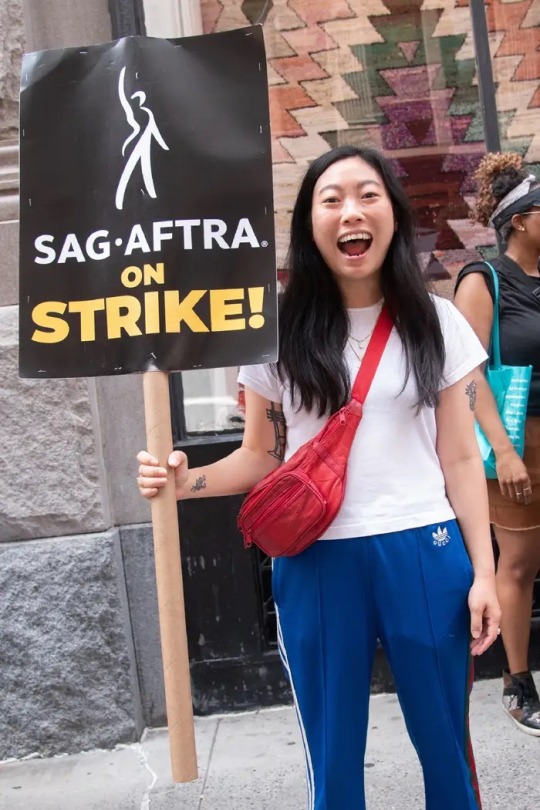
Girlcrush.
17 notes
·
View notes
Text
General Motors (GM.N) on Thursday made a counterproposal to the union representing its U.S. hourly workers in a bid to avoid a costly strike, but United Auto Workers President Shawn Fain called the offer "insulting."
The largest U.S. automaker said it offered workers a 10% wage hike and two additional 3% annual lump sum payments over four years in its offer to the union ahead of the Sept. 14 contract expiration.
Last week, Ford said it had offered a 9% wage increase through 2027 and 6% lump sump payments, much less than the 46% wage hike being sought by the union. The UAW has said 97% of members voted in favor of authorizing a strike if agreement is not reached.
Fain, who represents 146,000 workers at the Detroit Three, said GM's offer was "an insulting proposal that doesn’t come close to an equitable agreement for America’s autoworkers.... The clock is ticking. Stop wasting our members’ time. Tick tock."
GM shares were down 1.3% in mid-day trading.
GM said the wage hike is the largest proposed since 1999. It is also offering a $6,000 one-time inflation-related payment and $5,000 in inflation-protection bonuses over the life of the agreement, along with a $5,500 ratification bonus.
Chrysler-parent Stellantis said Wednesday it planned to make a counteroffer to the UAW this week.
GM said that under its offer, current temporary employees will receive a 20% increase to $20 per hour wage and it would shorten the time it takes to get to the maximum wage rate for permanent employees - mirroring proposals from Ford.
GM President Mark Reuss said in a video posted on Thursday "we need a fair contract that both rewards our employees and protects the long-term health of our business."
A UAW strike that shuts the Detroit Three manufacturers could cost carmakers, suppliers and workers over $5 billion, Michigan-based Anderson Economic Group estimated.
With new car inventories tight, consumer experts have said that could translate into higher car prices - an important component of inflation.
Last week, the UAW filed unfair labor practice charges with the National Labor Relations Board against GM and Stellantis saying they refused to bargain in good faith.
The union's demands include a 20% immediate wage increase followed by four 5% annual wage hikes, defined-benefit pensions for all workers, 32-hour work weeks and additional cost of living hikes. GM is proposing to give employees an additional paid holiday.
The UAW also wants all temporary workers at U.S. automakers to be made permanent, seeks enhanced profit sharing and the restoration of retiree health-care benefits and cost-of-living adjustments.
The UAW said Ford's profit-sharing formula change would have cut payouts by 21% over the last two years.
J.P.Morgan on Thursday said supply chain disruptions from a potential UAW strike would cut new vehicle production, drive up used car prices and put pressure on margins in the personal auto insurance business.
#us politics#news#reuters#2023#united auto workers#general motors#Shawn Fain#working class#worker's rights#Detroit Three#Stellantis#Mark Reuss#Anderson Economic Group#National Labor Relations Board#unfair labor practices#collective bargaining#j.p. morgan
6 notes
·
View notes
Note
I understand that most unions have a formal or informal policy of not crossing another union's picket line. In the event that two or more unions share a work space, doesn't that mean that if one strikes, the other is effectively coerced into joining the strike, with all of the costs and none of the potential gains? This very issue has come up in the Vancouver, Canada transit system recently, so it's not just a hypothetical.
If there is a formal rule, it usually takes the form of a contractual right for individual workers to choose to honor picket lines, so that workers aren't penalized or lose their jobs for refusing to cross.
Those contractual rights are pretty rare at least in the North American context. Secondary boycotts (when a union launches a boycott against a company that does business with a struck company) or secondary pickets (when a union pickets a company that does business with another company) are usually not legal (It's a bit unclear whether they are legal in Canada), and the union having a rule that forbids workers or penalizes them for crossing another union's pickets would constitute a secondary boycott/picket and would be illegal under (at least U.S) labor law. Even the "right to conscience" steps up close to the line (pun intended).
That being said, sometimes unions do collectively bargain for that right - my old union (UAW 2865) had it although most U.C unions didn't have it, and the Teamsters usually have one because it's a big part of their internal culture (...when it suits them).
youtube
That being said, I do take issue with the framework of "coercion," and I certainly don't agree that the other union faces "all of the costs and none of the potential gains."
At its most fundamental level, the labor movement is and has always been about solidarity - about recognizing that we are all interconnected, that we share a common struggle and a common enemy. To be a part of the movement, to be in community with your fellow workers, is to accept a responsibility to act in solidarity with one another - and enforcing that responsibility as a price of membership in the community is not coercion, because without that no social group of any kind could exist. It's the same thing with prohibitions against scabbing or otherwise collaborating with the enemy during a struggle.
And just as that spirit of solidarity requires us to act in concert with the other members of our union, it also requires us to act in solidarity with other unions and the working class everywhere. This is not done out of guilt or moral altruism (this is a big part of my problem with the modern conception of "allyship" on the left), but out of a belief in reciprocity: we stand with others so that they will stand for us.
Or as someone more eloquent than me once put it:

#unions#trade unions#labor law#collective bargaining#labor#labor studies#labor movement#picket lines#strikes#boycotts#wga strike#sag aftra strike#canada#labor history
22 notes
·
View notes
Text
It’s Striking
Here’s the thing: the mail strikes are going to inconvenience me this year (have already done so - I get my meds via post), but I can mitigate against that. The nursing strikes, thank goodness, did not affect me directly, but I can see how they might if the future ones are necessary. Rail strikes are less of a thing for me currently as I’m not risking exposing my knackered immune system to public transport. That’s not the point.
All these events are inconveniencing people, making some parts of their lives harder, but if you’re not thinking about how workers choosing to protest in the only way left available to them - by withdrawing their labour, and crucially, not getting paid - and how vital these services are just by how they impact you, I don’t know what to tell you.
Everyone. EVERYONE needs to have the means at their disposal to live well, cover their basic needs of food and water, shelter, warmth, stability, security, family. EVERYONE. I’m not talking about deserving, I’m talking about needing. Every person on this planet needs the access to sustainable, secure living. And yes, I include in that criminals and drug users and people who don’t want to work. Everyone has the right to survival. The people on strike don’t have that. Their pay and conditions are so bad that people are leaving their organisations in droves, and those left are not being supported (not least because it’s proving difficult to replace the colleagues they’ve lost). They’re struggling to feed and safely house themselves and their families. This CANNOT be happening in the 21st Century, where we have more obscenely wealthy people than ever.
Union members think long and very hard before striking; it’s a huge matter for debate and negotiation, and is voted on by everyone in the union before the action is taken. Striking is a last resort, which should tell you a LOT.
So if you’re feeling angry or inconvenienced about it, do not blame the strikers - they are making an incredibly courageous move, and it’s the fault of the people failing to give them the means for survival (crucially - people who are incredibly wealthy and secure) that your post and your non-urgent medical appointments are being delayed, and you’re having to find other ways to get to work and school, etc. It’s on those failing to negotiate meaningfully, the greedy people putting profit above the safety and security of people like you. Don’t be fooled by media manipulation - those on strike have far more in common with you than you have with those telling you that the strikers are wrong. Never forget that. And never forget the importance of collective bargaining and the fact that rich people need you, and that you have more power than you realise.
#industrial action#support the strikers#strike#rail strike#postal worker strike#royal mail strike#nurses strike#collective bargaining#join a union#I'm BEGGING you#strength in numbers#capitalism#late stage capitalism#fay speaks#striking
25 notes
·
View notes
Text
Hey all. Me and my entire apartment complex are raising money to help the most urgently in need among us, and pay litigation fees to go after our property management company in court.
(The lawyers representing us are doing so at no charge.)
Said property management company has been continuing to rent units in our complex despite serious HVAC and plumbing issues. We've had heat and water shutoffs constantly during this winter, and it culminated at the beginning of this month in them asking everyone on the ground floor to vacate with a 30 day notice.
A little over a week later they sent out a retraction, saying that no one needed to move out, although they'd allow anyone who had already found new housing to end their lease with no penalty.
Then they tried, halfway through the month, to make everyone leave with three days' notice instead, claiming that they couldn't repair the heat and it wasn't safe for us to keep living here.
They sent out that notice on a Friday afternoon, mind you--making it even more difficult to get moving or storage arranged or contact any other leasing offices.
This wasn't legally enforceable, they didn't offer any alternate housing or help finding new permanent housing (at least not until people started threatening to sue), and now they're aggressively trying to get us to break up our collective organizing.
My roommates and I are okay--we're in the group that originally was told to leave and had been planning to move out anyway. But it's still been an incredibly stressful and disruptive experience.
Many of our former neighbors are in much worse situations and could really use help.
18 notes
·
View notes
Text

NEW YORK (AP) — HarperCollins Publishers and the union representing some 250 striking employees have agreed to enter into federal mediation, the first sign of a possible settlement since the work stoppage began in early November.
“We are excited to have this opportunity to continue bargaining with HarperCollins and hope they finally are ready to put a fair offer on the table,” Olga Brudastova, president of Local 2110 UAW, said in a statement Thursday. “We have been on strike for over two months at this point. It is time for us to resolve any outstanding differences and attempt to reset our relationship.”
HarperCollins, owned by Rupert Murdoch’s News Corp, issued a statement saying it hoped that meeting with an outside mediator would provide “a path forward.” The publisher had not met with union negotiators in months.
“We entered negotiations eager to find common ground, and we have remained committed to achieving a fair and reasonable contract throughout this process,” the company’s statement reads in part. “We are hopeful that a mutually agreed upon mediator can help find the solutions that have eluded us so far. HarperCollins has had a union for 80 years, with a long history of successful and fair contract negotiations. The company has the exact same goal now, and is actively working to achieve it.”
10 notes
·
View notes
Text

Things are pretty turbulent right now. The working class is being abused. Productivity is higher than it's ever been, but wages haven't risen to match or even kept up with inflation. Despite profits being at record highs, our wages are lower than they were two generations ago if you account for purchasing power. My grandparents made about $800 a month and their mortgage was $50. Most people where I live make $2,500 - yet the mortgage for a 2-bedroom home is $2,600. If you want to *RENT* that exact same home, you'll be paying $3,000 because the owner has you paying the mortgage, plus a profit.
(Yeah most people need roommates into their late 30s here, or one partner's entire pay goes toward housing.)
I'm also pretty sure all this anti-LGBTQA and pro-choice nonsense isn't about morality at all; it's about making sure the USA doesn't fall into a population crisis like the rest of the world.
Thing is, there's no such thing as a population crisis, except with endangered species and in capitalism. The world has finite resources; wouldn't fewer people be better? Fewer people means more resources to go around. I realized recently that they use our Social Security to scare us on this point. They claim that if we don't have babies, there won't be enough people paying taxes when we're old to support our SSI - but that's not how SSI works. We're paying into it NOW, actively, and if they'd keep their grubby fingers off of it, it would be fine from generation to generation. Thing is, they keep dipping into it like it's a petty cash box. But regardless, the idea that it will be paid by our children is nonsensical and a blatant scare tactic to get us to breed, because THEY need it, not because we need it.
The only way fewer people (when there are already 8,000,000,000 people on the planet) is a bad thing is because it means less worker bees.
Especially since the worker bees are more easily exploited if they're desperate, and what makes them desperate? Feeling replaceable - which requires lots of other worker bees waiting to replace them. That can't happen when there are fewer people and more than enough jobs to go around.
Just the other day, a real estate giant was televised at The Australian Financial Review Property Summit saying that workers are "arrogant," and think employers are lucky to have them when they need to think they're lucky to have jobs. He had the audacity to say that "we" (as in him and the owning class) need to "create a recession" and "we need unemployment to go up, ideally 40-50%."
SCREW. HIM.
Your time is a commodity that YOU own. Time is more valuable than money. All acquisition of money is for the purpose of being able to get back your time and be able to enjoy it.
YOU. OWN. YOUR. TIME.
And they don't like it. They don't want you to know that.
Because it's the most valuable thing on Earth. Without it, they have no one to make their products or perform their services. Without YOUR TIME, they would be broke.
So they want really badly to be able to own it. To make you feel like it doesn't actually belong to you. For you to feel "lucky" to give it away to them for pennies on the dollar of what you will make for them.
As Andrew Stanton, Donald McEnry, and Bob Shaw said (writers of A Bug's Life) "Those puny little ants outnumber us 100 to 1, and if they ever figure that out, there goes our way of life."
Well, guess what.
In the US, people like us outnumber billionaires by 412,500 : 1.
Globally, we outnumber them 2,504,696:1
Let's help each other figure it out.
Let's take back our lives.
ACT. In any way you can. Don't be passive; it enables them.
EDUCATE. They are terrified of a well-educated working class, so learn something every day. If you don't understand something as well as you'd like, read/watch/listen to as many sources as you can until you do. Never repeat something you see or hear unless you verify it by doing your own research. I like to do this by reading at least three separate articles from different sources, and then looking into the backstory of an issue. If you can afford to, go back to school, even if it's just online community college classes after work. Most importantly, share what you know. Teach others, if you can, with loving intention and their consent. Try to really connect and think of teaching as an opportunity to lift people up, not show off how smart you are. I mean, smart is sexy, but smart and humble? F'whoosh!
INCITE. You know that expression, "if you're paying attention, you should be angry"? Yeah, that's relevant here. Things are bad. If you look around and really take it in, the only people who shouldn't be angry are the super-wealthy, because they're on top and they're benefiting from the problems. Channel your anger into passion and drive, not rage or violence. Use that energy to make a positive difference, and inspire others to do the same.
ORGANIZ.: We really do outnumber them by 400,000 to 1 domestically and 2.5 million to 1 globally. They can push individuals around, and they can dominate a submissive, non-confrontational mass population. They can't take us all on. They control everything because they have so much more money than the average person, and can use it to buy power by putting it in the pockets of officials and politicians to influence our governing bodies. But when we group together and push back, we're stronger. That's why unions work, and why they HAAATE them. If we normalize unity, it won't be just unions, though. If we normalize unity, if we organize in everything, not just at work, we can really fight back. We can pool our resources to get our own lawyers and bill-writers and lobbyists to send to DC. We're not going to bribe officials like they do, but together we can make those "perks" and "gifts" and "donations" legally defined as the bribes they are and take the money out of politics. We can demand ethics and equal representation return to the norm for our elected representatives.
UPLIFT. We are all in this together. We are all housemates here on our home planet, and it's the only one we've got. They want us fighting. They want us to blame each other. They want us mad at teachers and burger flippers for wanting as much money as "skilled labor" instead of mad at our own employers for not paying us fairly, either. They want us mad at the migrant worker for "stealing our jobs" instead of mad at the person who exploits foreign workers, or the media for pushing that narrative when in reality, nobody else even wants those jobs. Because they're hard, dirty, exhausting, and have no growth potential. Even the Red vs. Blue thing is manufactured. They're playing us against each other so that we're too busy in-fighting to face the real threat with any effectiveness. Don't let them. Learn to recognize your peers, have compassion for your fellow humans, and uplift others. If the status quo is to think of the other person, we all do better. It is possible to thrive.
Just remember that you can't take care of others if your own basic needs are not met. That's what the Y is for - YOU. In a world where we all look out for one another, everyone's needs get met - but we're still fighting for that world. So, for now, please, don't forget to breathe, rest, sleep, take a break, drink some water, connect with people, and do something that makes you happy when you can.
In other words, please, take care of yourself. For me. For all of us. Okay?
Credit to the podcasts and video documentary makers I follow regularly. I learned a lot of this from them, and I'm sure much of what I've said here echos their own statements. They are:
https://www.youtube.com/c/SecondThought
https://www.youtube.com/@ThenNow
https://www.youtube.com/@JamesJani
https://www.youtube.com/@FDSignifire
https://www.youtube.com/@leejamiller
... and a whole lot more. I'll have to make a bigger list sometime.
2 notes
·
View notes